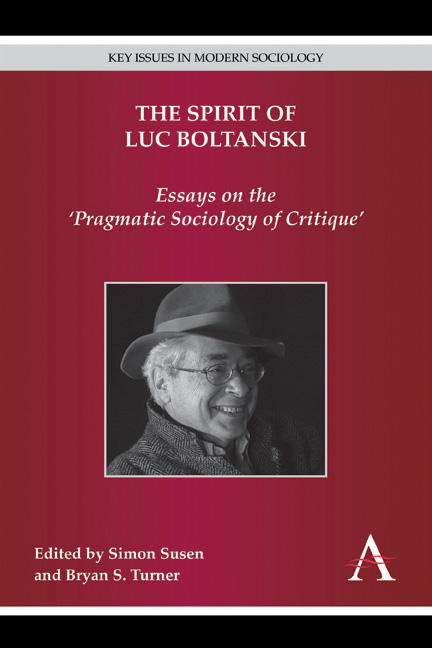Book contents
- Frontmatter
- CONTENTS
- List of Contributors
- Preface
- Part I Introductory Remarks
- Part II Luc Boltanski and (Post-) Classical Sociology
- Part III Luc Boltanski and Pragmatism
- Part IV Luc Boltanski and Critique
- Part V Luc Boltanski and Critical Sociology
- Part VI Luc Boltanski and Political Sociology
- Part VII Luc Boltanski and Contemporary Issues
- Part VIII Luc Boltanski in Conversation
- Part IX Luc Boltanski and His Critics
- Index of Names
- Index of Subjects
Preface
Published online by Cambridge University Press: 05 December 2014
- Frontmatter
- CONTENTS
- List of Contributors
- Preface
- Part I Introductory Remarks
- Part II Luc Boltanski and (Post-) Classical Sociology
- Part III Luc Boltanski and Pragmatism
- Part IV Luc Boltanski and Critique
- Part V Luc Boltanski and Critical Sociology
- Part VI Luc Boltanski and Political Sociology
- Part VII Luc Boltanski and Contemporary Issues
- Part VIII Luc Boltanski in Conversation
- Part IX Luc Boltanski and His Critics
- Index of Names
- Index of Subjects
Summary
The fact that Luc Boltanski is widely regarded as one of the most influential French sociologists of the late twentieth and early twenty-first centuries should be reason enough for putting together a collection of essays concerned with the major intellectual contributions that he has made to the humanities and social sciences. In our view, Boltanski has emerged as the most prominent, and also most innovative, French sociologist since the death of Pierre Bourdieu in 2002. It is ironic that, despite both the magnitude and the originality of Boltanski's oeuvre, one finds only few systematic commentaries, let alone edited books, on his work in the vast industry of contemporary sociological enquiry. The purpose of this volume is to fill this gap in the literature by creating opportunities for debate capable of representing the wide range of discussions that Boltanski's writings have sparked amongst researchers in the humanities and social sciences over the past decades.
As reflected in the title of this book, the ‘spirit’ of Luc Boltanski is inextricably linked to a paradigm commonly known as the ‘pragmatic sociology of critique’. In general terms, Boltanski is committed to studying the social conditions of human existence: (a) as a ‘sociologist’, he is concerned with its relational constitution; (b) as a ‘pragmatic sociologist’, he is interested in its practical constitution; (c) as a ‘pragmatic sociologist of critique’, he grapples with its discursive – and, hence, both political and moral – constitution. More specifically, Boltanski is determined to take ordinary actors seriously, insisting that they possess vital reflexive – that is, cognitive, normative, and evaluative – capacities, by means of which they shape the parameters underlying the daily construction of social life.
A cursory glance at the Table of Contents will suffice to notice that this volume seeks to cover a large variety of issues and controversies related to, and influenced by, Boltanskian thought. To this end, the book is divided into nine key – thematically organized – parts.
- Type
- Chapter
- Information
- The Spirit of Luc BoltanskiEssays on the 'Pragmatic Sociology of Critique', pp. xxiii - xxxPublisher: Anthem PressPrint publication year: 2014



